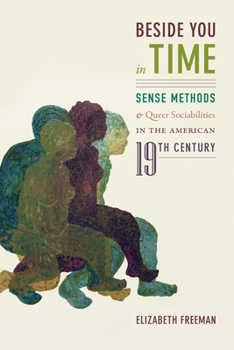Beside You in Time: Sense Methods and Queer Sociabilities in the American Nineteenth Century
Select Format
Select Condition 
Book Overview
In Beside You in Time Elizabeth Freeman expands biopolitical and queer theory by outlining a temporal view of the long nineteenth century. Drawing on Foucauldian notions of discipline as a regime that yoked the human body to time, Freeman shows how time became a social and sensory means by which people assembled into groups in ways that resisted disciplinary forces. She tracks temporalized bodies across many entangled regimes--religion, secularity,...
Format:Paperback
Language:English
ISBN:1478006358
ISBN13:9781478006350
Release Date:September 2019
Publisher:Duke University Press
Length:240 Pages
Weight:0.75 lbs.
Dimensions:0.5" x 6.0" x 8.9"
Customer Reviews
0 rating





